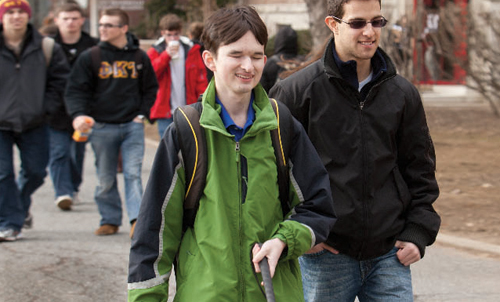Patrick Molloy '15 is featured in the documentary "One Stroke Difference."
 The Stephen McWilliams film follows the blind Muhlenberg College student who found his passion in golf.
The Stephen McWilliams film follows the blind Muhlenberg College student who found his passion in golf.
Tuesday, February 25, 2014 02:33 PM
The following is an excerpt from "Pillars of Support," a Winter 2012 original Muhlenberg Magazine article by Lindsey (Aspinall) Getz '04. For the full text, please visit Muhlenberg's magazine archives.
Part of the curriculum for his Spanish composition course, says Patrick Molloy ’15, includes writing essays and getting the professor’s feedback. Sounds pretty standard. But since Molloy is blind, the process posed a problem.
“Obviously I couldn’t read the corrections. So my professor and I decided to meet once a week and go through them line-by-line,” says Molloy. “That may make me sound like an exception but it’s actually what the professors here do for anyone.”

Patrick Molloy ’15 checks email in Seegers Union.
That’s a story disabled Muhlenberg students tell again and again, whether they have a physical or learning challenge – or just need extra help. Muhlenberg is a college that supports its students – whatever their needs may be.
“The fact is that Muhlenberg is known for its interactive and responsive teaching methodology,” says Christopher Hooker-Haring ’72, P’08, P’10, dean of admission and financial aid. “And that’s something that appeals not only to students with disabilities, but also mainstream students as well.”
But there’s little doubt that being a disabled college student poses special problems for both the student and the institution. And it’s becoming an increasingly significant challenge for Muhlenberg and for colleges and universities nationwide.
According to two longitudinal studies by research institute SRI International, 46 percent of young adults with disabilities were attending a college or university within four years of leaving high school in 2009. That compares to 26 percent in 1990. Today, the proportion of all college students with any sort of disability is now 11 percent, according to a report by the General Accounting Office.
The increase reflects population trends, to some extent. But it’s also a direct result of the Americans With Disabilities Act, passed by Congress in 1990 and reauthorized in 2008. That law prohibits educational institutions from discriminating against students who are disabled.
Muhlenberg was accommodating long before the law required it, says Dr. Daniel Wilson, professor of history, who has been on campus since 1978. Due to post-polio syndrome, he began using a scooter several years ago.
“In the ’80s, many individual faculty members would make adjustments on their own in order to aid students with disabilities prior to an institutional commitment,” he says. “There’s an attitude of caring here that’s always been obvious, and I think that does make it easier for people with disabilities to adjust.”
In fact, Molloy says that he visited numerous campuses in his college search and that ‘Berg was truly the friendliest of them all. “It really stood out in terms of having such a nice community of people,” he says. “That definitely helped make it a smooth transition here.”
Muhlenberg will be screening "One Stroke Difference" by Stephen McWilliams, Villanova University, in the Great Room on Thursday, February 27 at 4 p.m. The event is free and open to the public, but seating will be limited.
